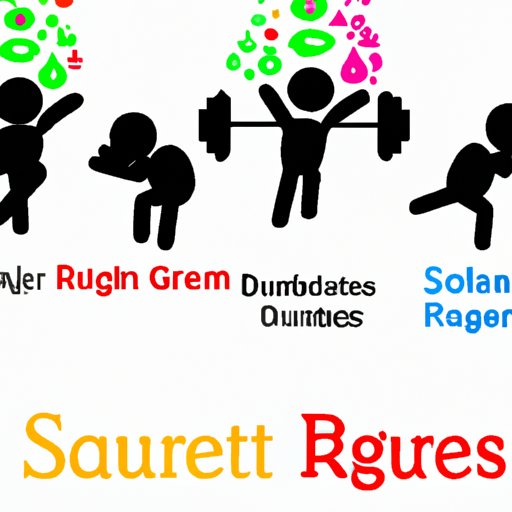
I. Introduction
Sugar is an integral part of many people’s diets, especially in the form of processed foods and sugary beverages. However, consuming excessive amounts of sugar has been linked to a myriad of health concerns, including chronic fatigue. In this article, we will explore the relationship between sugar intake and fatigue and provide tips for reducing sugar cravings and increasing energy levels.

II. The Link Between Excessive Sugar Intake and Fatigue
Many individuals experience a sugar rush after consuming high-sugar foods or beverages. However, this burst of energy is often short-lived and followed by a sudden crash, which can leave individuals feeling more tired than before. When we consume foods high in sugar, our blood glucose levels spike, triggering the pancreas to produce insulin to regulate them. While insulin works to bring glucose levels back down, it can also promote the storage of glucose as fat and lead to a sudden drop in energy levels.
Over time, this process can lead to insulin resistance, a condition in which the body produces insulin but becomes resistant to its effects. This increases the likelihood of developing type 2 diabetes, which can cause chronic fatigue syndrome.
III. How Consuming Too Much Sugar Can Leave You Feeling Drained
Sugar consumption can lead to fatigue in a variety of ways. One way in which sugar can affect energy levels is through its impact on the brain’s production of hormones such as dopamine and serotonin. Both of these neurotransmitters play a crucial role in regulating mood and energy levels and are influenced by sugar consumption. Consuming too much sugar can alter the balance of these hormones, leading to feelings of lethargy and tiredness.
In addition, consuming high amounts of sugar can lead to sudden spikes and drops in blood sugar levels, which can contribute to sugar crashes. Symptoms of a sugar crash can include shaking, sweating, confusion, and fatigue.
IV. Is Your Sugar Intake Affecting Your Sleep Patterns and Energy Levels?
Sugar intake can also impact sleep patterns and overall energy levels. While consuming caffeine and sugar to stay awake during the day may seem like a short-term solution, long-term, it can lead to a cycle of poor sleep that contributes to chronic fatigue.
Sugar consumption can disrupt the body’s natural sleep cycle by affecting the release of serotonin and melatonin, hormones that play a role in regulating sleep. Consuming sugar too close to bedtime can interfere with the production of melatonin, leading to difficulty falling and staying asleep. Over time, a lack of adequate sleep can negatively impact energy levels during the day.
V. The Science Behind Why Sugar May be Contributing to Your Chronic Fatigue
Recent research has linked sugar consumption to systemic inflammation, a condition in which the immune system becomes overactive and starts to attack healthy cells and tissues. Chronic inflammation can lead to a range of health problems, including chronic fatigue syndrome. Studies have also linked insulin resistance, a condition frequently associated with excessive sugar consumption, to chronic inflammation.
VI. Why Cutting Down on Sugar Could be the Key to Feeling More Energized
Reducing sugar intake can lead to numerous benefits, including increased energy levels. A diet high in sugar can contribute to an excessive amount of empty calories, leading to weight gain, fatigue, and other health concerns. A well-balanced diet consisting of whole, nutrient-dense foods can provide sustained energy throughout the day.
Incorporating more fiber-rich foods into your diet can also help to slow the absorption of sugar into the bloodstream, preventing blood sugar spikes and crashes and promoting more sustained energy levels.
VII. How to Curb Your Sweet Tooth and Boost Your Productivity
Reducing sugar cravings can be challenging, especially if you are used to consuming a lot of sugary foods and drinks. However, making small changes to your diet and lifestyle can make a significant difference.
One way to reduce sugar cravings is by incorporating more protein into your diet. Protein can help to regulate blood sugar levels and keep you feeling full and satisfied for longer periods, reducing the likelihood of snacking on sugary foods throughout the day. Eating a balanced breakfast containing protein-rich foods can also promote sustained energy levels throughout the day.
Choosing healthier alternatives to sugary foods can also help to reduce cravings. For example, swapping candy for fresh fruit or choosing a piece of dark chocolate instead of milk chocolate can satisfy a sweet tooth while providing health benefits.
VIII. The Surprising Connection Between Sugar Consumption and Afternoon Slumps
Many individuals experience a dip in energy levels during the mid-afternoon, commonly referred to as the afternoon slump. This can cause a decrease in productivity and focus, making it challenging to complete daily tasks.
While there are several factors that can contribute to the mid-afternoon slump, consuming large amounts of sugar can exacerbate the problem. Blood sugar levels can start to dip during this time, leading to feelings of fatigue and lethargy. Choosing healthy snacks such as nuts, seeds, or vegetables can help to regulate blood sugar levels and prevent the mid-afternoon slump.
IX. Conclusion
Excessive sugar intake can lead to a myriad of health concerns, including chronic fatigue. However, by understanding how sugar affects the body and making small changes to your diet and lifestyle, it is possible to boost energy levels and improve overall health and wellness.
By reducing sugar intake and incorporating whole, nutrient-dense foods into your diet, you can promote sustained energy levels throughout the day. Additionally, choosing healthier alternatives to sugary foods and snacks and making dietary changes, such as incorporating more protein and fiber, can help to curb sugar cravings and improve overall health and well-being.
Take small steps to make changes to your diet and lifestyle today, and enjoy increased energy levels and improved focus tomorrow.




